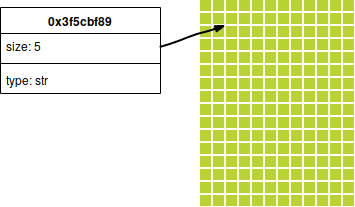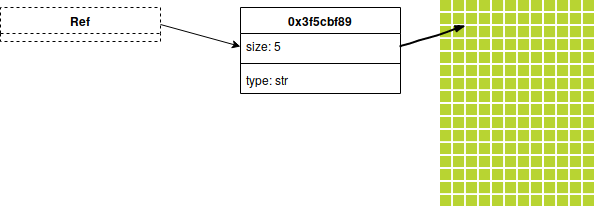Porque Você Deveria Aprender Rust
Porque Você DEVE Aprender Rust
- Júlio Biason
- https://functional.cafe/@juliobiason
- julio.biason@pm.me
- http://presentations.juliobiason.net
História
- Criada em 2006 por Graydon Hoare.
- Patrocinada pela Mozilla em 2009.
- Versão 1.0 em 2015.
- Versão atual: 1.37
História

Basic (com números e estruturado), dBase III Plus, Clipper, Pascal, Cobol, Delphi (ObjectPascal), C, C++, ActionScript (Flash), PHP, JavaScript, Python, Objective-C, Clojure, Java, Scala , Rust.

1. A Linguagem Mais Amada
A linguagem mais amada segundo o StackOverflow Survey 2019
... pelo 4⁰ ano seguido.
2. "Low Level Language with High Level Abstractions"
Resultado final com performance semelhante ao C...

... mas com abstrações em algo nível
- Strings sem tamanho fixo
- Listas
- Mapas
3. Compilador Chato mas Amigável
fn main() -< int{
let a = 2;
a = 3;
println!("{}", a);
0
}
3 | let a = 2;
| -
| |
| first assignment to `a`
| help: make this binding mutable: `mut a`
4 | a = 3;
| ^^^^^ cannot assign twice to immutable variable
3 | let a = 2;
| -
| |
| first assignment to `a`
| help: make this binding mutable: `mut a`
4 | a = 3;
| ^^^^^ cannot assign twice to immutable variable
3 | let a = 2;
| -
| |
| first assignment to `a`
| help: make this binding mutable: `mut a`
4 | a = 3;
| ^^^^^ cannot assign twice to immutable variable

4. Borrow Checker
a = String::from("hello");
a tem o valor "hello""
a tem o valor "hello""
0x3f5cbf89 = "hello"

fn main() {
let a = String::from("hello");
let _b = a;
println!("{}", a)
}
error[E0382]: borrow of moved value: `a`
--> src/main.rs:5:20
|
4 | let _b = a;
| - value moved here
5 | println!("{}", a)
| ^ value borrowed here after move
|
= note: move occurs because `a` has type
`std::string::String`, which does not
implement the `Copy` trait
E se eu precisar acessar a variável em mais de um lugar?
References
fn main() {
let a = String::from("hello");
let _b = &a;
println!("{}", a)
}

Regras do Borrow Checker
Uma região de memória tem apenas um dono.
Passar um valor (região de memória) de uma variável para outra, troca o dono.
A região é desalocada quando o dono sair de escopo.
Regras do Borrow Checker
Uma região de memória pode ter infinitas referências.
... desde que elas não durem mais do que o dono.
Regras do Borrow Checker
É possível ter uma referência mutável de uma região de memória.
... mas para haver uma referência mutável ela deve ser a única referência.

presente := Presente { ... }
canal <- presente
presente := Presente { ... }
canal <- presente
presente.abrir()Hora da anedota!

localtime
SimpleDateFormatter
Rust resolveria isso?
SIM
... porque nem ia compilar.
5. Tipos Algébricos
enum
enum IpAddr {
V4,
V6
}
enum IpAddr {
V4(String),
V6(String),
}
let home = IpAddr::V4(String::from("127.0.0.1"));
match home {
V4(address) => println!("IPv4 addr: {}", address),
V6(address) => println!("Ipv6 addr: {}", address),
}
enum Option<T> {
Some(T),
None
}
6. Error Control
try:
something()
except Exception:
pass
try {
something();
} catch (Exception ex) {
System.out.println(ex);
}
FILE* f = fopen("someting.txt", "wb");
fprintf(f, "Done!");
fclose(f);
enum Result<T, E> {
Ok(T),
Err(E),
}
match File::create("something.txt") {
Ok(fp) => fp.write_all(b"Hello world"),
Err(err) => println!("Failure! {}", err),
}
match File::create("something.txt") {
Ok(fp) => match fp.write_all(b"Hello world") {
Ok(_) => (),
Err(err) => println!("Can't write! {}", err),
}
Err(err) => println!("Failure! {}", err),
}
let mut file = File::create("something.txt").unwrap();
file.write(b"Hello world").unwrap();
let mut file = File::create("something.txt")?;
file.write(b"Hello world")?;
OK(())
7. Generics/Traits
Structs
struct Gift {
package_color: String,
content: String
}
Structs
let presente = Gift { package_color: "red", content: "A GIFT!" };
Structs Genéricas
struct Point<T> {
x: T,
y: T
}
Structs Genéricas
let my_point = Point(x: 1.0, y: 2.0);
Enums Generics
enum Result<T, E> {
Ok(T),
Err(E),
}
Traits
trait Summary {
fn summarize(&self) -> String;
}
struct Phrase {
phrase: String
}
impl Summary for Phrase {
fn summarize(&self) -> String {
self.phrase
.split_whitespace()
.map(|word| word.chars().nth(0).unwrap())
.collect()
}
}
fn get_summary<T>(summarizable: T) -> String
where T: Summary
{
...
}
8. Cargo
"Cargo is the Rust package manager"
"Cargo downloads your Rust package’s dependencies, compiles your packages, makes distributable packages, and uploads them to crates.io, the Rust community’s package registry."
9. Tests
#[cfg(test)]
mod tests {
#[test]
fn testing() {
}
}
$ cargo test
Compiling adder v0.1.0 (file:///projects/adder)
Finished dev [unoptimized + debuginfo] target(s) in 0.22 secs
Running target/debug/deps/adder-ce99bcc2479f4607
running 1 test
test tests::testing ... ok
10. Macros
?Log-Derive
#[logfn(ok = "TRACE", err = "ERROR")]
fn call_isan(num: &str) -> Result<Success, Error> {
if num.len() >= 10 && num.len() <= 15 {
Ok(Success)
} else {
Err(Error)
}
}
11. Crazy stuff

E agora?
- Júlio Biason
- https://functional.cafe/@juliobiason
- julio.biason@pm.me
- http://presentations.juliobiason.net